Bishop Ann Svennungsen offered this sermon during the Reformation worship of the Ministerium gathering of the Minneapolis Area Synod and the Saint Paul Area Synod at Christ the King Lutheran Church in New Brighton, Minnesota, on October 31, 2017.
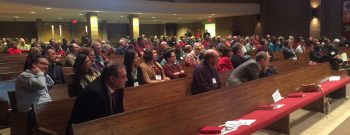 I’ve been thinking about what Luther would say if he were here today. How does his message from the Middle Ages translate into the 21st century?
I’ve been thinking about what Luther would say if he were here today. How does his message from the Middle Ages translate into the 21st century?
So much has changed. Are his words even relevant? In the 16th century, the church was at the top of the triangle in a well-arranged hierarchy of church, empire, and household. It was illegal not to be a Trinitarian Christian. Jews were given some leeway, but if you were Jon Hus proposing that people receive both bread and wine – and that scripture be translated into their language – you could be burned at the stake.
The legal and social compulsion to be a Christian was as high as it ever was. Compare that to today: Just 50 years ago, it was assumed a good citizen was also a member of a faith community. Now, even those cultural expectations are gone – not to mention any legal pressure.
Most of my daughters’ friends don’t go to church. They are remarkable people; I like them all. Most are social activists; they teach in impoverished school districts, work for legal aid, or volunteer in free medical clinics. But the encouragements felt by their parents to be church members are not there for them.
Oh, I don’t have any desire to return to the Middle Ages. I believe the death of Christendom is actually an opportunity for resurrection – the rising of a church centered on the Gospel of Jesus Christ.
But how do we create that present day reformation? What would Luther say to us? What would he say to the people who aren’t looking for a gracious God – but wondering if there’s a God at all? And who ask, if there is a God, how does that even matter in my own, personal life?
INTERESTINGLY, ONE OF THE THEOLOGIANS who has helped me with this question isn’t even Lutheran. Douglas John Hall clearly states that he’s not a Lutheran, never has been, never intends to be, … but, he says, “I wouldn’t have become a theologian (perhaps I wouldn’t have remained a Christian) had I not been introduced to Martin Luther (this splendid, bombastic, impulsive, and deeply honest human being).”
Hall’s book Waiting for Gospel: An Appeal to the Dispirited Remnants of Protestant Establishment has helped me grapple with the Reformation’s relevance today.
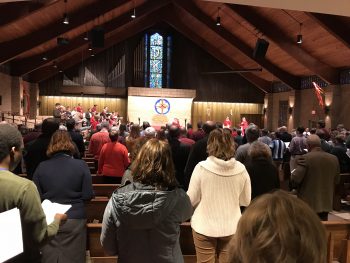
Just like Luther, Hall’s greatest lament is the way we also confuse law and gospel. Oh, the law we proclaim is not about buying indulgences; but it is about exhortation and imperatives. On one hand, we preach about moral improvement; offer strategies for personal growth – and think that is Gospel. On the other hand, we ask folks to work for justice, peace, and the environment; to fight racism, sexism and homophobia; and think that is Gospel. Oh, Hall says, “let me be clear, I am not asking for less activism. Christians who act for justice and peace are truly “not far from the kingdom of God.”
“I don’t have any desire to return to the Middle Ages. I believe the death of Christendom is actually an opportunity for resurrection – the rising of a church centered on the Gospel of Jesus Christ.”
And yet, exhortation is not the good news. The law is not gospel. And fulfilling the law is always beyond our grasp. To love neighbor as self is not just about acts, but also about heart, about motivations. And purity of thoughts and motives is always beyond our grasp. Luther knew this well.
“Though I lived as a monk without reproach,” he wrote, “I felt I was a sinner before God. I could not believe God was satisfied by my penance. Indeed, I did not love, but hated the righteous God who punishes sinners, and secretly, I was angry with God. I said ‘is it not enough that miserable sinners are eternally lost and crushed – without also having God add pain to pain, threatening us to be righteous as God is righteous.”
In the midst of that dark night of the soul, Luther was transformed by his study of Romans. “At last, he writes, by the mercy of God, I began to understand that the righteousness of God is that by which the righteous live by a gift of God, namely by faith. And this is the meaning: The righteousness of God is revealed by the gospel, namely, the passive righteousness with which the merciful God justifies us by faith. Here I felt that I was altogether born again and had entered paradise itself through open gates.”
Born again. When was the last time someone told you they felt they’d been born again? That is the work of the Gospel. Something more radical than all our exhortations can ever produce.
IT IS ALSO POSSIBLE THAT mainline Protestant preachers don’t hear about people being born again because we only preach about the healing of society. We forget the anguish of individuals. Or, we leave the healing of hearts and spirits to therapists, counselors, support groups, prescription providers. Oh, don’t get me wrong. I am the first to recommend counseling, treatment – all the gifts of God given through medicine and psychology. Still, what about “both/and” rather than “either/or?”
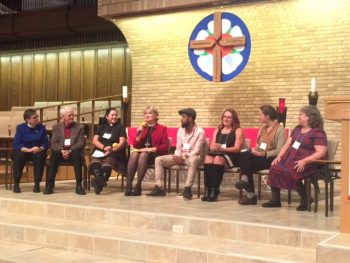 I was recently asked to recommend a counselor for someone dealing with depression. I thought long and hard about therapists I knew; sent out some email inquiries; took time to report my ideas. But, did I ever suggest that the person visit with their pastor for prayer? Did I ever wonder if weekly communion might just be part of the road to new life?
I was recently asked to recommend a counselor for someone dealing with depression. I thought long and hard about therapists I knew; sent out some email inquiries; took time to report my ideas. But, did I ever suggest that the person visit with their pastor for prayer? Did I ever wonder if weekly communion might just be part of the road to new life?
“Fulfilling the law is always beyond our grasp.”
We know it takes courage to speak to social ills like unchecked capitalism, racism, patriarchy – but it also takes courage to speak to the heartbreaking, subtle, often unrelenting problems in someone’s personal life. Each person has their own story of sorrow and pain – some more public than others. Indeed, we mostly carry our struggles in private.
Yes, we can work to change social ills – but within each social ill is a person whose pain goes deep. “Is there any reason for me to hope for a future? Is anything meaningful I can do?” Even God seems to ask – in the flood, in the prophets – can a creature as fragile and self-conscious as a human survive? We are finite, fallible, and mortal. Not even the best social science can address those 3 a.m. thoughts that remind us of our mortality and insignificance.
And, what is more, we are surrounded by cultural expectations of success, having it all together, staying upbeat and positive. There’s great pressure to appear content, to seem in charge, … even when we’re not.
I recently spoke with Kate Welton Reuer, our ELCA campus pastor at the U of M, and she shared a concern being expressed across all our college campuses. In this country, estimates are that one third of college students suffer from depression. One third. Could this be related to the expectations we have? Students wonder: “Am I good enough? Am I smart enough? Am I strong enough to meet the expectations I, my parents, and others have for me?”
“Am I enough?” It’s a question with power to plague us our whole lives long. It was Luther’s question – it’s also ours. Am I enough?
The law won’t address that question. All the exhortations, social analyses, calls to justice – essential as they are – can’t address this fundamental angst of the human soul. And left to our own internal conversations, even our most positive and consistent self-talk, we will not be able to set ourselves free from whatever prison we find ourselves in. It is Gospel that addresses our deepest yearning. It is God’s love in Christ that has the unique power to proclaim, “Yes, you are enough. You are loved. You are forgiven.”
With undying love and unconditional commitment God comes to you – right where you are – and says that you are beautiful, whole, enough. This is Gospel.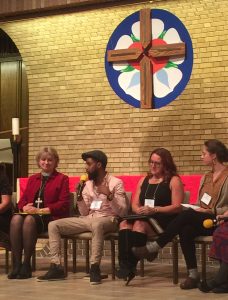
In his interview with Krista Tippett, Martin Sheen talks about his own experience of conversion/rebirth. I know there are enough West Wing fans here to know that I’ve got your attention. (I think Bob Hulteen has watched the series 13 times). Sheen says, “I was searching for that elusive thing that all of us search for. Most of the time we’re not even conscious of it, but we’re searching for ourselves in an authentic way. We want to recognize the person we see in the mirror, and embrace that person with all the brokenness and lackluster, all the things that only we are aware of in the depths of our being. … I came back to Catholicism, and it was the single most joyful moment of my life, because I knew that I had come home to myself. In deeply personal ways, this satisfaction has lasted all these years. I’m still on the honeymoon. Go figure. The love that I longed for, and I think all of us really long for, is knowing that we are loved. A knowingness about our being that unites us to all of humanity, to all of the universe. That despite ourselves, we are loved. And when you realize that, … it makes all the difference. … You know how, so often, people say — and I said it, too — that ‘I’m looking for God.’ But God has already found us, really. … And when we find that love, that presence, deep within our own personal being — that love is overwhelming.”
“We can’t manufacture beloved-ness, it needs to be proclaimed.”
When Tippett asks him how prayer works for him, he says the central energy of prayer is that communion at the Eucharist. “For the most part, I’m just so stunned and so joy-filled that … I just pray ‘thank you.’”
Like in the Eucharist, the gospel comes from outside of us. We can’t manufacture beloved-ness, it needs to be proclaimed. Luther talked a lot about extra “nos” (outside of us). The good news comes from outside of us. The righteousness of Christ – outside of us – becomes our very own through the grace of God.
We need preachers to proclaim that word; we need a community willing to pour the water, share wine, break bread, and offer it as gospel to all of us who await with empty hands. And freed in the gospel, born again, assured we’re enough, we will be free to engage the work of justice, to throw ourselves into the healing of all creation.
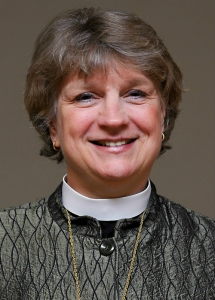 By Bishop Ann Svennungsen
By Bishop Ann Svennungsen 

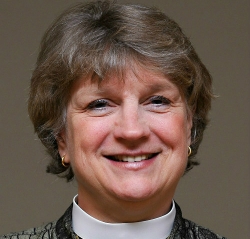
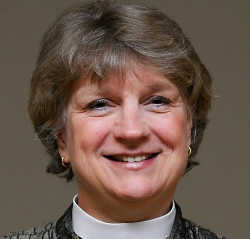

 I’ve been thinking about what Luther would say if he were here today. How does his message from the Middle Ages translate into the 21st century?
I’ve been thinking about what Luther would say if he were here today. How does his message from the Middle Ages translate into the 21st century?
 I was recently asked to recommend a counselor for someone dealing with depression. I thought long and hard about therapists I knew; sent out some email inquiries; took time to report my ideas. But, did I ever suggest that the person visit with their pastor for prayer? Did I ever wonder if weekly communion might just be part of the road to new life?
I was recently asked to recommend a counselor for someone dealing with depression. I thought long and hard about therapists I knew; sent out some email inquiries; took time to report my ideas. But, did I ever suggest that the person visit with their pastor for prayer? Did I ever wonder if weekly communion might just be part of the road to new life?
